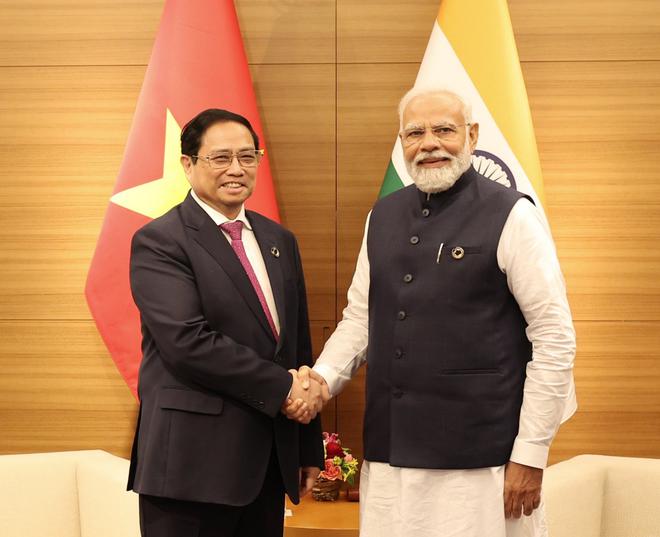Prime Minister Narendra Modi on May 20 held productive bilateral talks with South Korean President Yoon Suk Yeol during which they agreed to deepen cooperation in areas like trade and investment, IT hardware manufacturing and defence and reaffirmed their commitment to further strengthen bilateral ties.
They also discussed India's G20 presidency and South Korea's Indo-Pacific strategy.
The two leaders met on the sidelines of the summit of the Group of Seven (G7) advanced economies in Hiroshima.
Also Read | PM Modi holds meeting with Japanese counterpart Kishida
"PM @narendramodi had a productive meeting with @President_KR Yoon Suk Yeol. India and the Republic of Korea share a warm friendship and deep-rooted cultural linkages. Today’s talks focused on ways to further cement this friendship in key developmental sectors," the Ministry of External Affairs (MEA) tweeted.
"Advancing – Special Strategic Partnership. PM @narendramodi met @President_KR Yoon Suk Yeol of the Republic of Korea," it said.
During the meeting, they reaffirmed their commitment to further strengthen bilateral ties as the two nations celebrate 50 years of diplomatic relations this year, it said.
They agreed to deepen cooperation in areas of trade and investment, high technology, IT hardware manufacturing, defence, semiconductor, and culture, the ministry said.
They also discussed India's G20 presidency and South Korea’s Indo-Pacific strategy, it said.
India is presently holding the presidency of the G20 grouping.
South Korea launched its first comprehensive regional strategy, the Indo-Pacific Strategy in December 2022.
The US, India and several other world powers have been talking about the need to ensure a free, open and thriving Indo-Pacific in the backdrop of China's rising military manoeuvring in the resource-rich region.
China claims nearly all of the disputed South China Sea, though Taiwan, the Philippines, Brunei, Malaysia and Vietnam all claim parts of it. Beijing has built artificial islands and military installations in the South China Sea. China also has territorial disputes with Japan in the East China Sea.
Modi arrived in Hiroshima on May 19 to attend three sessions at the G7 summit following an invitation by Japanese counterpart Fumio Kishida.
PM Modi, Vietnamese counterpart discuss expanding cooperation in trade and investment, defence, technology
Prime Minister Narendra Modi on Saturday held wide-ranging talks with his Vietnamese counterpart Pham Minh Chinh and discussed expanding cooperation in areas like trade and investment, defence and energy.

The two leaders met on the sidelines of the summit of the Group of Seven (G7) advanced economies in Hiroshima.
“Propelling - ties to new levels. Wide-ranging talks between PM @narendramodi and PM Pham Minh Chinh of Vietnam,” the Ministry of External Affairs (MEA) tweeted.
“Leaders discussed expanding cooperation in the fields of trade and investment, defence, building resilient supply chains, energy, science & technology, human resource development, culture & people to people ties,” it said.
Talks also covered regional developments as well as the Association of Southeast Asian Nations (ASEAN) and cooperation in the Indo-Pacific region, it added.
ASEAN nations include Brunei, Cambodia, Indonesia, Laos, Malaysia, Myanmar, the Philippines, Singapore, Thailand, and Vietnam.
The US, India and several other world powers have been talking about the need to ensure a free, open and thriving Indo-Pacific in the backdrop of China’s rising military manoeuvring in the resource-rich region.
China claims nearly all of the disputed South China Sea, though Taiwan, the Philippines, Brunei, Malaysia and Vietnam all claim parts of it. Beijing has built artificial islands and military installations in the South China Sea. China also has territorial disputes with Japan in the East China Sea.







